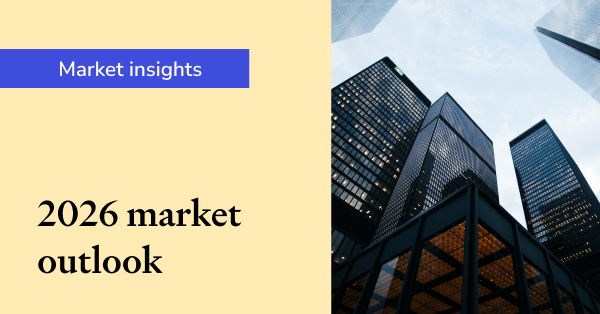What today’s investors can learn from UK stock market trends
The UK stock market has a rich history, having evolved over centuries to become one of the most important financial centres in the world. From its humble beginnings in London’s coffee houses, to the digitised, high-frequency trading environment of today, each era has brought with it significant changes and valuable lessons for today’s investors. Understanding the evolution of the market can provide important insights into economic cycles, regulatory changes and investment strategies that remain relevant today.

The birth of the UK stock market: Foundations of modern investing
In 1571, the Royal Exchange was established as the City of London’s centre of commerce. Many forms of goods and services were traded here, but stockbrokers were quickly banned due to their loud and rowdy means of conducting business. They were however welcome at London coffee houses, where they would informally gather to buy and sell shares in companies.
The origins of the UK stock market can be traced back to the 17th century, when traders would gather in London coffee houses to buy and sell shares in ventures such as the East India Company. This informal system evolved into a structured market, leading to the establishment of the London Stock Exchange (LSE) in 1801, making it one of the world’s first regulated stock exchanges.
Lesson: Regulation matters
Investors today benefit from strict market oversight and transparency, reducing risks such as fraud and manipulation. However, history shows that regulations evolve in response to past market failures. Staying informed about regulatory changes can help investors navigate compliance and protect their assets.
The industrial revolution and the rise of public companies
The 19th century saw a boom in industrialisation, leading to a surge of publicly listed companies. Railways, mining firms and manufacturing companies raised capital by issuing shares. The rise of joint-stock companies allowed investors to participate in economic growth while limiting their liability.
Lesson: Economic growth drives market opportunities
Booming industries often present lucrative investment opportunities, but not all are sustainable. Investors should assess long-term viability, avoiding speculative bubbles that can emerge during rapid economic transformations.
The 20th century: Wars, crashes and recoveries
The UK stock market endured extreme volatility in the 20th century, shaped by global conflicts, economic crashes and recoveries.
- The Great Depression (1929-1939) saw sharp declines in stock prices, leading to regulatory reforms such as stricter financial disclosures
- World War II (1939-1945) caused disruptions, but the post-war recovery spurred economic expansion and renewed market growth
- The Black Monday crash of 1987 saw the FTSE 100 lose over 20% of its value in a single day, driven by automated trading and investor panic.
Lesson: Market crashes are inevitable, but so are recoveries
While market crashes can be daunting, history shows that they are often followed by strong recoveries. Investors who stay patient and maintain a diversified portfolio can weather downturns and benefit from long-term growth.
The Big Bang of 1986: A market revolution
One of the most transformative moments in UK stock market history was the Big Bang of 1986. This deregulation of financial markets removed fixed commissions on trades, introduced electronic trading, and allowed foreign firms to own UK brokers. The result was a surge in trading volumes and London’s rise as a global financial hub.
Lesson: Adaptability is key
Markets evolve rapidly due to technological and regulatory changes. Investors who adapt—whether by embracing online trading, ETFs or alternative asset classes—position themselves for long-term success.
The 21st Century: Globalisation, crises and digital Investing
Throughout the 21st century, the UK stock market has been shaped by globalisation, financial crises and digital transformation. For example:
- The Dot-Com Bubble (2000-2002) highlighted the risks of overvalued tech stocks, reminding investors to focus on fundamentals rather than hype
- The 2008 Financial Crisis saw major banks collapse, leading to stricter financial regulations and increased investor scrutiny
- Brexit (2016-2020) introduced uncertainty, affecting UK stock prices and causing volatility in the pound
- The COVID-19 Pandemic (2020-2021) led to an initial market crash, followed by rapid recoveries driven by fiscal stimulus and tech-sector resilience.
Lesson: Diversification mitigates risk
Global events can impact UK stocks in unpredictable ways. A well-diversified portfolio—spanning different sectors and geographical regions—can help investors manage risk and seize new opportunities.
Looking ahead: What the past teaches us about the future
As we move forward, several key lessons from history remain relevant:
- Stay invested for the long term: Short-term volatility is inevitable, but history favors those who remain committed to their investment strategy
- Embrace innovation, but stay cautious: Emerging industries (such as green energy and AI) can offer strong growth potential, but speculative bubbles must be avoided
- Regulation shapes markets: Investors should stay informed about changes in financial regulation, as these often impact trading conditions and investment strategies
- Economic cycles repeat: Recognising patterns in market booms and busts helps investors make more informed decisions.
The takeaway
The UK stock market has evolved dramatically over centuries, shaped by economic progress, financial crises and regulatory shifts. By studying history, investors can gain valuable insights into market behavior, risk management and long-term wealth-building strategies. Whether navigating volatility, capitalising on emerging trends, or adjusting to regulatory changes, the past offers a blueprint for informed investing in the future.
Become a smarter investor with Sharesight
If you’re not already using Sharesight, sign up for a free account to get the performance insights you need to make smarter, more informed investing decisions.
Disclaimer: This article is for informational purposes only and does not constitute a specific product recommendation, or taxation or financial advice and should not be relied upon as such. While we use reasonable endeavours to keep the information up-to-date, we make no representation that any information is accurate or up-to-date. If you choose to make use of the content in this article, you do so at your own risk. To the extent permitted by law, we do not assume any responsibility or liability arising from or connected with your use or reliance on the content on our site. Please check with your adviser or accountant to obtain the correct advice for your situation.
FURTHER READING

Sharesight product updates – January 2026
Our latest updates include Abu Dhabi exchange support, enhanced dividend insights, overview page refinements, mobile app improvements and more.

2026 market outlook: Expert insights on risks, rates and opportunities
We talk to industry experts about their expectations for markets in 2026 — from inflation and interest rates to market opportunities, the AI bubble and more.

Sharesight users' top trades – December 2025
Welcome to the December 2025 edition of Sharesight’s monthly trading snapshot, where we look at the top buy and sell trades by Sharesight users over the month.